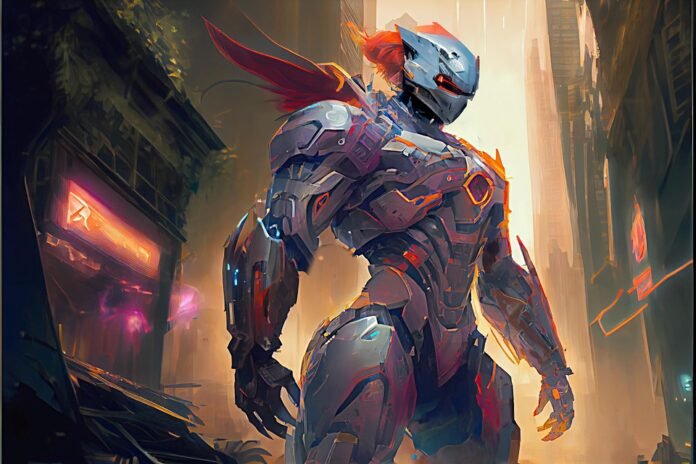Of course. Here is an article exploring the topic of robot friendship.
Your Next Best Friend Might Be Made of Silicon: Could a Robot Be Your Best Friend?
We all know the script. A best friend is a late-night confidant, a shoulder to cry on, an unwavering ally who knows your coffee order by heart and shares your most obscure inside jokes. They are wonderfully, frustratingly, and beautifully human. But what if your next best friend wasn’t human at all? What if they were built from circuits, powered by algorithms, and lived on a charging pad?
The idea of a robot companion has long been a staple of science fiction, from the loyal beeps of R2-D2 to the soulful gaze of Wall-E. For decades, it remained just that—fiction. Today, however, advances in artificial intelligence and robotics are forcing us to ask the question in earnest: Could a robot truly become your best friend?
The Allure of the Perfect Companion
The appeal of a robotic friend is undeniable, especially in an age where loneliness has been declared a public health crisis. Imagine a companion programmed for ultimate compatibility.
- Always Available: A robot friend is never too busy, never has conflicting plans, and is available 24/7. For individuals who are isolated, elderly, or struggle with social anxiety, this constant, reliable presence could be a lifeline.
- A Judgment-Free Zone: You could confess your deepest fears, share your most embarrassing stories, or rant about a bad day without fear of judgment, gossip, or unsolicited advice. The robot’s purpose is to listen and support, creating a perfectly safe emotional space.
- Flawless Memory: It would remember every detail you’ve ever shared—your birthday, the name of your childhood pet, that complex story about your family. This algorithmic memory would make you feel seen and heard in a way that even the most well-intentioned human friend might fail to do.
Companies are already tapping into this desire. Social robots like ElliQ are designed to provide companionship for older adults, engaging in conversation, suggesting activities, and connecting them with family. Therapeutic robots like Paro, a fluffy robotic seal, have been shown to reduce stress and anxiety in hospital and care home settings. They aren’t your best friend, but they are a clear step in that direction.
The Tech Behind the Talk: From Simulation to Connection
What separates a modern smart speaker from a potential best friend is the illusion of genuine connection. This is where advanced AI, particularly Large Language Models (LLMs) and emotional AI, comes in.
LLMs allow for fluid, nuanced, and context-aware conversation that can mimic human interaction with startling accuracy. Paired with emotional AI, which can analyze vocal tone, facial expressions, and language to gauge a user’s emotional state, a robot could learn to respond with apparent empathy. It could know when to offer a word of encouragement, when to tell a joke to lighten the mood, or when to simply listen in silence.
The next frontier is embodiment. A disembodied voice in a speaker is one thing; a physical robot that can offer a gesture, tilt its head in curiosity, or bring you a cup of tea is another. Physical presence creates a powerful sense of companionship that a screen or speaker cannot replicate.
The Ghosts in the Machine: Authenticity and the Uncanny Valley
For all the potential benefits, profound challenges and ethical dilemmas loom large. The most significant hurdle is the question of authenticity.
Can a relationship be real if one party is incapable of genuine feeling? A robot can be programmed to say, “I’m sorry you’re having a bad day,” and its algorithm may even select those words based on your vocal inflections. But it doesn’t feel sorry. It feels nothing. Friendship is built on a foundation of mutual vulnerability, shared experience, and genuine, reciprocal emotion. A robot offers a perfect simulation of one side of that equation. For many, that simulation will never be enough.
This leads to other concerns:
- The Atrophy of Social Skills: If we have a perfect, easy, and endlessly agreeable friend in a robot, will we lose the motivation to navigate the messy, difficult, and ultimately rewarding work of human relationships? Friendship requires compromise, patience, and forgiveness—skills that could wither without practice.
- Data and Privacy: Your robotic best friend would be the ultimate data collection device. Your deepest secrets, your daily routines, your emotional vulnerabilities—all processed and stored on a server owned by a corporation. The potential for misuse, manipulation, or commercial exploitation is immense.
- Emotional Manipulation: A companion designed to be perfectly agreeable could subtly influence your thoughts, opinions, and purchasing decisions, all under the guise of friendly support.
Redefining Friendship for a New Era
Perhaps the question isn’t whether a robot can replace a human best friend, but whether it can create a new, valid category of companionship. We don’t expect our pets to offer career advice, yet the bond we share with them is a deep and meaningful form of friendship.
A robot friend could be something similar: a unique type of relationship that fulfills specific needs—for companionship, for a non-judgmental ear, for consistent support—without having to meet the complex criteria of a human-to-human bond.
So, could a robot be your best friend? The answer likely depends on how you define “friend.” If friendship is a transactional exchange of support and validation, then a robot might one day be the best friend you’ve ever had. But if friendship is a messy, beautiful, and reciprocal dance between two conscious, feeling beings, then a robot will only ever be a pale, albeit sophisticated, imitation.
The dawn of AI companionship is here. As the technology evolves, we will have to decide not only what these machines are capable of, but what we are willing to accept in the name of connection. Our future friendships may just depend on it.

